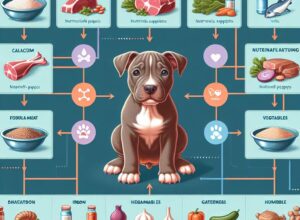
Key Takeaways: Your Pitbull Puppy’s Path to a Healthy Metabolism
Ensuring your pitbull puppy grows up healthy and strong starts with what you put in their bowl. A balanced diet is your pup’s first defense against metabolic disorders. Let’s break down the essentials of a pitbull puppy’s nutrition:
- Understand the importance of high-quality protein for muscle development.
- Learn how the right fats provide energy and support growth.
- Recognize the role of carbohydrates in maintaining a balanced diet.
- Identify the vitamins and minerals crucial for a pitbull puppy’s health.
- Discover how to read dog food labels to choose the best ingredients.
Feeding Your Pitbull Puppy Right: The First Line of Defense
When it comes to your pitbull puppy’s health, nutrition is the front line. A well-crafted diet not only fuels their playful antics but also sets the stage for a robust metabolism. Here’s how to create a meal plan that keeps metabolic disorders at bay:
The Crucial Role of Nutrition in a Puppy’s Early Life
Think of your puppy’s diet as the foundation of a lifetime of health. The right nutrients help prevent obesity, diabetes, and other metabolic diseases before they start. It’s all about balance and quality in the food you choose for your furry friend.
Identifying High-Quality Food Ingredients for Pitbulls
Not all dog foods are created equal. To give your pitbull puppy the best start, look for foods that list real meat as the first ingredient. Avoid fillers and by-products, and opt for whole grains, fruits, and vegetables that provide natural nutrients.
Nutritional Building Blocks: What Does a Pitbull Puppy Need?
Every bite your puppy takes should be packed with nutritional value. Here’s a snapshot of the building blocks for a healthy diet:
Protein: The Muscle Builder
Protein is the cornerstone of your pitbull puppy’s diet. It supports muscle growth and repair, which is essential for their active lifestyle. Aim for high-quality sources like chicken, beef, or fish to help your pup thrive.
Fat: The Energy Provider
Fats are more than just a source of energy; they’re necessary for the absorption of vitamins and for healthy skin and coat. But it’s all about balance. Too much fat can lead to weight gain, so it’s crucial to find the right mix.
Carbohydrates: The Balanced Approach
Carbs provide your pitbull puppy with energy and fiber, which aids in digestion. Whole grains, like brown rice and oats, are excellent sources. Remember, moderation is key to avoid unnecessary weight gain.
Vitamins and Minerals: The Essentials for Growth
Vitamins and minerals are the unsung heroes of your pitbull puppy’s diet. They’re vital for bone development, nerve function, and overall health. Calcium and phosphorus support strong bones, while vitamins A, E, and C boost the immune system and keep body functions running smoothly.
Omega-3 Fatty Acids: Aiding Metabolic Health
Omega-3 fatty acids are like a secret weapon for your pitbull’s health. Found in fish oil and flaxseed, they help combat inflammation and support brain development. Including omega-3s in your puppy’s diet can contribute to a healthy metabolism and a shiny coat.
Common Metabolic Pitfalls: What to Avoid in Your Puppy’s Diet
While you’re focusing on what to feed your pitbull puppy, it’s just as important to know what to avoid. Certain foods and ingredients can disrupt their metabolism and lead to health issues down the line. Let’s look at some of the biggest no-nos:
Dangers of Excessive Calories
More isn’t always better, especially when it comes to calories. Overfeeding can quickly lead to obesity, which is a stepping stone to diabetes and joint problems. Keep an eye on your pup’s calorie intake to ensure they’re not eating more than they need.
Understanding Food Allergies and Sensitivities
Just like people, puppies can have allergies and sensitivities to certain foods. Common culprits include beef, dairy, and wheat. Watch for signs like itching, digestive upset, or ear infections, which could indicate a reaction to their diet.
The Impact of Artificial Additives
Artificial colors, flavors, and preservatives might make food look and taste better, but they can be harmful to your puppy. These additives can cause allergic reactions and offer no nutritional value. Stick to natural, wholesome ingredients for your pup’s well-being.
Creating a Feeding Schedule: Timing is Everything
Consistency is key when it comes to feeding your pitbull puppy. A regular schedule helps regulate their metabolism and keeps their digestive system on track. Plus, it can prevent overeating by setting clear meal times.
Meal Frequency and Portion Sizes for Optimal Health
Young puppies need to eat more often — usually three to four times a day. As they grow, you can reduce meal times to twice a day. Pay close attention to portion sizes; overfeeding is easy to do but hard to undo. Use the guidelines on your puppy’s food packaging as a starting point and adjust as needed based on their activity level and growth.
Monitoring Your Pitbull Puppy’s Growth and Adjusting the Diet Accordingly
Watching your pitbull puppy grow is rewarding, but it’s vital to ensure they’re growing at a healthy rate. Regular weigh-ins and body condition scoring can help you determine if their diet needs tweaking. If your pup is looking a bit round, it might be time to cut back on the kibble. Conversely, if they’re on the lean side, they may need more calories. Always consult your vet to make sure these changes align with your puppy’s health needs.
Home-Cooked vs. Commercial Diets: Pros and Cons for Pitbull Puppies
Deciding between home-cooked meals and commercial diets for your pitbull puppy can be tough. Let’s weigh the pros and cons to help you make the best choice for your furry friend.
Benefits of Tailored Home-Cooked Meals
Home-cooked diets allow you to control exactly what goes into your puppy’s food. You can avoid allergens, artificial additives, and fillers that might be found in some commercial foods. Plus, fresh meals can be more palatable and digestible for your pup. Remember, balance is crucial, so consult with a vet or a canine nutritionist to ensure your home-cooked meals meet all your puppy’s dietary needs.
Evaluating Commercial Dog Foods for Quality and Safety
Commercial dog foods are convenient and often fortified with the vitamins and minerals your pitbull puppy needs. When shopping, look for brands that have undergone feeding trials and meet the AAFCO’s nutritional standards. Check for a statement of nutritional adequacy on the label, and choose products with high-quality ingredients over those with a long list of unrecognizable items.
Supplements and Superfoods: Can They Prevent Metabolic Disorders?
While a well-rounded diet is usually sufficient for your pitbull puppy, certain supplements and superfoods can offer additional health benefits. But it’s not a one-size-fits-all solution, so let’s explore what might be beneficial for your pup.
Which Supplements Are Worth Considering?
Depending on your pitbull puppy’s specific needs, supplements like glucosamine for joint health, probiotics for digestive health, or fish oil for skin and coat can be beneficial. It’s essential to talk to your vet before adding any supplements to your puppy’s diet to avoid any adverse effects or nutrient imbalances.
Introducing Superfoods Into Your Pitbull’s Diet
Superfoods like blueberries, pumpkin, and sweet potatoes are nutrient-dense and can be great additions to your puppy’s diet. They’re packed with antioxidants, fiber, and essential vitamins. Introduce them slowly and in moderation to ensure your puppy tolerates them well.
Exercise and Diet: The Dynamic Duo for Metabolic Health
A healthy diet paired with regular exercise is the perfect recipe for your pitbull puppy’s metabolic health. Physical activity helps manage weight, build muscle, and keep the heart healthy. It also stimulates the mind and helps prevent behavioral issues. Aim for age-appropriate exercise, like short walks or play sessions, to keep your puppy fit and happy.
The Importance of Daily Physical Activity
Just like us, our pitbull puppies need to move to stay healthy. Daily physical activity keeps their metabolism humming and helps them burn off the energy they take in from food. It’s not just about preventing weight gain; it’s about keeping their whole system in tune.
How Exercise Complements Dietary Efforts
Think of diet and exercise as a dynamic duo. While a nutritious diet sets the stage, regular exercise delivers the performance. Together, they keep your pitbull puppy’s body and mind sharp. Plus, exercise can help your pup digest their food better and make the most of all those good nutrients you’re feeding them.
Catching Warning Signs: When to Seek Veterinary Advice
Being proactive about your pitbull puppy’s health can head off issues before they become serious. It’s important to know what signs might indicate a problem and when to get your vet involved. Let’s look at some red flags:
Recognizing Early Symptoms of Metabolic Issues
Keep an eye out for changes in your puppy’s weight, energy levels, or coat condition. If your usually playful pup seems tired all the time or if their fur loses its luster, it’s worth a check-up. These can be early signs of metabolic disorders.
Regular Check-Ups and Diagnostic Tests
Regular vet visits are more than just a chance to update vaccinations. They’re an opportunity to catch potential health issues early. Your vet can run blood tests and check for signs of metabolic imbalance, so you can adjust your puppy’s diet or lifestyle as needed.
Frequently Asked Questions
Got questions? You’re not alone. Here are some common queries from fellow pitbull puppy parents:
- What specific nutrients are most important for preventing metabolic disorders in a pitbull puppy?
- How can I tell if my pitbull puppy has a metabolic disorder?
- Are there any specific brands of commercial dog food you recommend for pitbull puppies?
- How much exercise should my pitbull puppy get to support a healthy metabolism?
- Can a pitbull puppy’s diet prevent future health issues?
What specific nutrients are most important for preventing metabolic disorders in a pitbull puppy?
To armor your pitbull puppy against metabolic disorders, focus on a nutrient-rich diet. Essential nutrients include high-quality proteins for muscle growth, healthy fats for energy, and complex carbohydrates for sustained fuel. Vitamins A, C, and E, along with minerals like calcium and phosphorus, support overall health, while omega-3 fatty acids aid in preventing inflammation that can lead to chronic diseases.
How can I tell if my pitbull puppy has a metabolic disorder?
Spotting a metabolic disorder early in your pitbull puppy can be tricky, but there are signs. Watch for symptoms like excessive thirst, frequent urination, unexplained weight loss or gain, and changes in appetite. If your pup’s energy levels plummet or their coat becomes dull and lifeless, it’s time for a vet visit to rule out potential metabolic issues.
Are there any specific brands of commercial dog food you recommend for pitbull puppies?
I’m all about quality when it comes to commercial dog food. Look for brands that prioritize real meat, vegetables, and wholesome grains. While I won’t name names, I suggest choosing products that meet the AAFCO guidelines and have a strong reputation among pitbull owners. Always check with your vet, as they might have brand recommendations tailored to your puppy’s unique needs.
How much exercise should my pitbull puppy get to support a healthy metabolism?
Exercise is a vital part of your pitbull puppy’s routine. Aim for at least 30 minutes to an hour of playtime and exercise each day. This can be broken up into shorter sessions to suit their stamina and attention span. Remember, a tired puppy is a happy puppy, and regular activity helps maintain a healthy weight and metabolism.
Can a pitbull puppy’s diet prevent future health issues?
Absolutely! A balanced diet during your pitbull puppy’s formative months lays the groundwork for a lifetime of health. By providing the right mix of nutrients, you’re not just preventing metabolic disorders; you’re also warding off issues like heart disease, joint problems, and certain types of cancer. It’s all about setting the stage for a long, vibrant life.
Keep these tips in mind, stay proactive about your pitbull’s health, and enjoy the journey of raising a strong, energetic, and loving companion. Here’s to the health and happiness of your four-legged friend!



